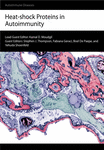Journal list menu
Export Citations
Download PDFs
Review Article
Open Access
oa
Heat Shock Proteins and Regulatory T Cells
- First Published: 14 March 2013
Review Article
Open Access
oa
The Immunosuppressive Activity of Heat Shock Protein 70
- First Published: 17 December 2012
Review Article
Open Access
oa
Impact of Exercise and Metabolic Disorders on Heat Shock Proteins and Vascular Inflammation
- First Published: 17 December 2012
Review Article
Open Access
oa
Heat Shock Proteins: Pathogenic Role in Atherosclerosis and Potential Therapeutic Implications
- First Published: 11 December 2012
Review Article
Open Access
oa
CD91-Dependent Modulation of Immune Responses by Heat Shock Proteins: A Role in Autoimmunity
- First Published: 19 November 2012
Review Article
Open Access
oa
Role of Hsp90 in Systemic Lupus Erythematosus and Its Clinical Relevance
- First Published: 04 October 2012
Review Article
Open Access
oa
Aberrant Activation of Heat Shock Protein 60/65 Reactive T Cells in Patients with Behcet’s Disease
- First Published: 02 October 2012
Review Article
Open Access
oa
Heat Shock Proteins, Autoimmunity, and Cancer Treatment
- First Published: 29 September 2012
Review Article
Open Access
oa
M. paratuberculosis Heat Shock Protein 65 and Human Diseases: Bridging Infection and Autoimmunity
- First Published: 29 September 2012
Review Article
Open Access
oa
H11/HspB8 and Its Herpes Simplex Virus Type 2 Homologue ICP10PK Share Functions That Regulate Cell Life/Death Decisions and Human Disease
- First Published: 27 September 2012
Research Article
Open Access
oa
HSP70 and HSP90 Differentially Regulate Translocation of Extracellular Antigen to the Cytosol for Cross-Presentation
- First Published: 25 September 2012
Research Article
Open Access
oa
The Role of M. leprae Hsp65 Protein and Peptides in the Pathogenesis of Uveitis
- First Published: 27 August 2012
Clinical Study
Open Access
oa
Improved Metabolic Control in Diabetes, HSP60, and Proinflammatory Mediators
- First Published: 12 August 2012




